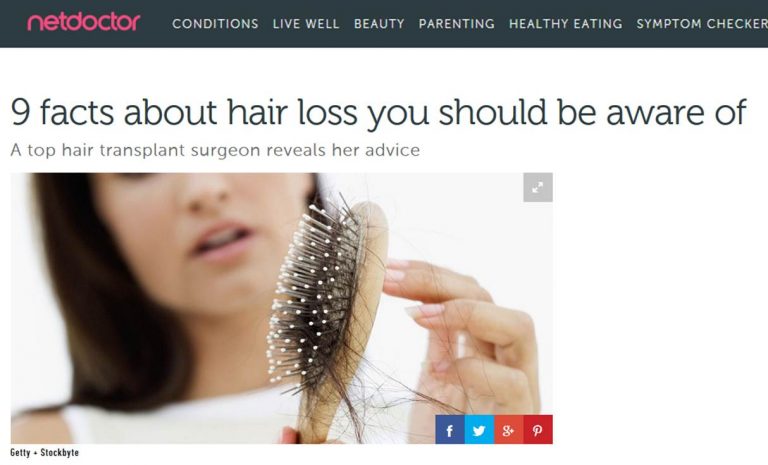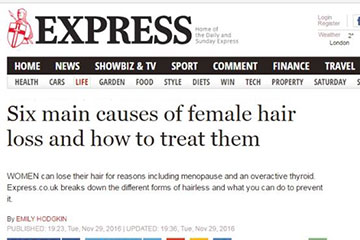
- Common hair loss can be treated with preventative hair loss medication
- We are UK leaders in Hair Loss and Hair Restoration treatments
- A consultation will ensure that you receive professional advice on hair loss
What’s on this page
Medically reviewed by Lorcan Sheppard BSc MBBS FRCA, Chief Medical Officer for The Private Clinic of Harley Street, London.
Last Reviewed June 10th 2024
Hair Loss
Hair Loss Treatment Medications
Hair loss can hugely undermine your confidence. No matter how young or old you are, a receding hairline, hair loss or thinning hair can make anyone self-conscious.
If you are concerned about hair loss or are considering hair restoration treatments we can offer advice and help to find the most suitable treatment course for you.
The Private Clinic of Harley Street, London are UK leaders in Hair Loss and Hair Restoration treatments. We can help you understand the cause of your hair loss or scalp problems and offer the widest range of Hair and Scalp treatments, from thinning hair and scalp irritation solutions to some of Europe’s top FUE Hair Transplant surgeons – for both men and women with all hair types, including Afro-Caribbean.
Your hair loss treatment journey always starts with a consultation with one of our hair experts to understand your concerns and what you really want to achieve. We can then offer the best bespoke treatment option for you. Our clinics are in London Harley Street, Birmingham, and Northampton.
What causes hair loss?
There is a wide range of causes for hair loss in men and women. Genetics, hormonal changes, medical conditions aging – it can often be difficult to know what the direct cause may be. Our team are very knowledgeable in being able to identify the cause of hair loss and are well experienced in a wide range of hair loss conditions such as:
- Alopecia Areata
- Traction Alopecia
- Anagen Effluvium
- Telogen effluvium
- Central Centrifugal Cicatricial Alopecia
- Frontal Fibrosing Alopecia
- Thinning Hair
- Receding Hairline
- PCOS Hair Loss
- Female Pattern Hair loss / Androgenetic alopecia
- Male Pattern Baldness / Androgenetic alopecia
- Dissecting Cellulitis of the Scalp
- Folliculitis Decalvans
- Lichen Planopilaris
Can I treat hair loss with medication?
In a lot of the hair loss causes listed above, medication may be recommended to help treat the cause which will then enable the hair to grow.
Understanding the cause of your hair loss is the best way to determine which type of hair loss treatment or medication is going to be most effective for you.
More of us are beginning to become aware of the increasing number of treatments and solutions on offer to treat hair loss – medication, shampoos, lotions and dietary supplements. Whilst these may be able to help some patients, there are only two types of hair loss medication with proven results.
What is hair loss medication?
There are only two types of US Food and Drug Administration (FDA) approved and medically-proven hair loss products available and these are Finasteride and Minoxidil. These medications are widely used to help with hair loss and are recommended by many specialists including our own Hair Transplant surgeons.
Whether you have just started to notice hair thinning and would like some advice on how to prevent further male hair loss or female hair loss, or if you are already experiencing baldness and considering a hair transplant, our team will be able to provide the most effective and suitable treatment for you.
What to Expect
The Private Clinic has been treating patients for over 40 years with thousands of people placing their trust in us each year. We pride ourselves on being able to offer a personalised service. We have a team of friendly nurses and expert surgeons who understand the importance of this decision and will support you throughout your journey with us.
Hair Loss Medication Consultation
Hair Thinning, Hair Loss & Scalp Problems – If you’re in the early stages of hair loss or have noticed signs of damage in your hair or scalp, and are thinking about taking medication but not sure what your options are, we advise you to meet with one of our highly-experienced, hair loss experts.
Our expert team will examine your hair loss and aim to find out what’s causing it, before leading you toward the best solution for your needs. Sometimes treatment can be as simple as bespoke dietry or nutritional plans, or using specially formulated products to encourage growth. They are also able to provide more information about the different types of Hair Loss Medication and recommend what they feel would be best suited for you and your hair loss to help you achieve the results you want.
For more information on hair thinning and scalp problems, click here.
Hair Loss Medication Options
Hair Loss Medication is designed to help manage hair loss and slow its process – it is best suited for those who are experiencing early signs of hair loss or, for those in later stages, in combination with a restoration treatment. Minoxidil and Finasteride (Propecia) are the only two currently approved solutions and each work in different ways.
Minoxidil Hair Loss Medication
Minoxidil is available without prescription and, while its key principles are still not entirely understood, it is thought to work by widening blood vessels and potassium channels, thus allowing more nutrients, oxygen and blood to the hair follicle and encouraging healthy hair growth.
Finasteride Hair Loss Medication
Finasteride – also known as Propecia® or Proscar® – is only available through prescription. For men suffering from male pattern baldness (androgenic alopecia), it works by preventing testosterone from being converted into dihydrotestosterone (DHT), a hormone which causes hair to fall out. According to statistics, there is an 80% to 90% possibility of slowing or stopping hair loss using the Finasteride.
Hair Restoration Treatment
Hair Restoration – While medication and other treatments can help stop or slow down hair thinning, surgical hair restoration is the only solution to restore areas where extensive hair loss has taken place.
At The Private Clinic, we only work with the most advanced form of minimally-invasive FUE(Follicular Unit Extraction); a process where by individual follicles are extracted and transplanted one-by-one to leave no linear scarring and natural looking results.
Click here for more information on FUE hair transplantation.
Minoxidil
What is Minoxidil?
Minoxidil is antihypertensive vasodilator which was originally used to control high blood pressure. In 1987, scientists developed a topical minoxidil solution after discovering that users of Minoxidil were seeing significant hair growth whilst taking the medication. Minoxidil for hair loss is supplied in a topical solution which available in either a 2% or 5% concentration strength, it is usually sold under the brand name Rogaine.
How to use Minoxidil
Minoxidil is a topical solution that may come in a liquid or foam solution. It should only be used on the scalp
- Minoxidil should be applied directly to the scalp two times a day.
- When you apply Minoxidil, your hair and scalp should be dry.
- Do not wash or shampoo your hair for 4 hours after applying the Minoxidil solution.
- Allow the minoxidil to completely dry for 2 to 4 hours after applying it before wearing a hat, going to bed etc as the solution can stain clothing, hats, and bed linen.
- Do not use heated hair tools such as a hair dryer on the head following application. – This can make the treatment less effective.
- Avoid transferring the Minoxidil solution to other areas of the body and always wash your hands after application.
How does Minoxidil work?
When Minoxidil is applied to the scalp the enzymes within your scalp known as sulfotransferase work to convert the solution into a salt called minoxidil sulfate. Minoxidil works to shorten the resting (telogen) phase of the hair and encourages the hair to enter the growing (anagen) phase of the hair cycle a lot quicker.
How long does it take for Minoxidil to work?
It can often take up to 8 weeks of continued use for the results of Minoxidil to be noticed.
Finasteride
What is Finasteride?
Finasteride is a fully licensed UK medication for hair loss that belongs to a group of medicines known as ‘5-alpha-reductase inhibitors’. Finasteride is a prescription-only oral medication that can be prescribed to men to help reduce hair loss and male pattern baldness. Finasteride is often referred to as Propecia, but this is just a branded version. The UK patent for Finasteride expired in 2014, which means that you will be able to get ‘generic Finasteride’ from pharmacies which is the same as branded versions such as Propecia. Finasteride is not approved for use by women.
How does Finasteride work?
Finasteride medication works by stopping testosterone from being converted into dihydrotestosterone (DHT). DHT causes hair follicles to shrink which results in hair loss, so blocking DHT allows the hair follicles to grow back to their normal size.
How to use Finasteride?
Finasteride is taken in tablet format orally. It will need to be taken once a day, ideally at the same time.
How long does it take for Finasteride to work?
Results are normally seen around three to six months after beginning Finasteride medication. It is most effective at treating hair loss where there is thinning and a receding hairline. It is not as effective in areas of complete hair loss. Finasteride can also encourage new, stronger, thicker and faster hair growth.
.
Frequently Asked Questions
The most important thing before looking into a cure is to find out the causes and stages of your hair thinning.
Each client is given a consultation at our Harley Street clinic, during which we will analyse the cause of your hair loss and advise as to the treatment options available for you.
Hair Loss in Men
About 25 per cent of men begin losing hair before they reach 30 and two thirds before the age of 60.
The most common cause of hair loss in men is genetic:
(1) Androgenetic alopecia (male pattern baldness) has a characteristic pattern; it begins with a slight recession at the front hairline and is followed by thinning on the crown of the head. The hair above the ears and at the nape of the neck is unaffected. Hair loss is related to three independent factors:
Genes: Baldness genes can be passed on by either parent. However having the gene does not necessarily mean you will go bald. For example, a man whose father is severely bald may only have minimal hair loss himself.
Hormones: The hormone directly involved in Alopecia is Dihydrotestosterone (DHT). DHT decreases the length of the growing cycle so that with each new cycle the hair shaft becomes progressively smaller and weaker.
Age: Genes and hormones are not enough by themselves to cause baldness. Hair loss occurs when the susceptible follicles are exposed to DHT over a period of time. However the age at which this process starts differs from person to person.
(2) Alopecia Areata will affect 1% to 2% of the population at some point in their lives. Most sufferers are children and young adults (below 40 years of age) though it can affect people of all ages. The hair loss is sudden and manifests itself in small, smooth-skinned patches that are likely to gradually widen with time. It can also affect the sufferer’s nails, giving them a pitted, ridged or brittle appearance. The exact cause is still unknown although current theories include an auto-immune disease, stress or suggest a genetic basis. If the hair loss progresses until all the scalp hair is lost this is known as Alopecia Totalis or Alopecia Universalis if all the body hair is lost as well.
(3) Hair loss can also result from a scalp problem. Inflammation of the scalp leads to production of superoxide which causes hair shedding and will lead to diffuse hair loss.
These are just a few of the reasons for hair loss.
Hair Loss in Women
Female hair loss can be particularly traumatic and it is generally even harder for a woman to accept than it is for man. If the hair begins to fall out it can be more than just upsetting, it can be devastating, leading to a total loss of confidence and even depression. It’s no wonder that a high percentage of female hair loss sufferers have reported depression, breakdown of both relationships and careers due to the psychological distress caused by their condition.
A large percentage of female hair loss is caused by inherited genetic influence and an over production of the male hormone testosterone. Hormonal changes occur during and following childbirth, through use of the contraceptive pill, anaemia and the menopause. These are the most common causes of hair loss in woman:
Stress-related
Genetic hair loss
Polycystic ovary syndrome
Adrenal Tumour
Hair loss following pregnancy, miscarriage or abortion
The contraceptive pill
Anaemia
The Menopause
Hair Loss in Men
The good news is that most men who use prescription courses will experience hair loss stabilisation and varying degrees of hair re-growth in a reasonably short period of time.
Prescribed medications for male hair loss have two main purposes: a) to block the DHT hormone (the cause of male hair loss) from reaching and destroying vulnerable hair follicles, b) to stimulate and increase the blood circulation that is crucially needed to feed and nurture the existing hair follicles that are prone to the effects of male hair loss. Without good blood circulation the hair follicles will gradually shrink and die.
Find out more about Hair Loss Medication here.
Hair Loss in Women
Women genetically predisposed to hair loss have enzymes that turn the hormone ‘testosterone’ into another hormone derivative, ‘dihydrotestosterone’ (DHT). When DHT is formed, it attaches itself to the hair follicles on the top of the head, causing them to continually shrink with every growth cycle. This causes the hair to gradually become thinner until the follicles finally become dysfunctional and the hair no longer grows.
The first objective to prevent further hair loss is to block DHT from reaching the hair follicles, while the second is to ensure the hair follicles are receiving as much ‘hair-friendly’ blood as possible. There are 2 medically proven products, which are licensed by the UK medical regulatory body the MHRA, and approved by its US counterpart the FDA.
A hair transplant is something that many patients suffering from hair loss may consider at some point in their lives but they would worry about whether natural looking results can be achieved. We can all recall people in the public eye who have had a hair transplant with very poor results and most people are not aware of how much the technique and the doctor’s experience impact on the final outcome.
Until recently, hair transplant procedures have been difficult to carry out and have not always been successful. Older techniques can cause scarring in the donor area and may not produce the natural results that either the patient or surgeon would hope for. This is why it is essential for anybody considering a hair transplant to do a lot of research and choose an experienced hair transplant doctor.
There are mainly 2 different procedures available: the Strip Method – a more invasive treatment which may result in extensive scarring and requires a longer recovery – and a second far less invasive method called Follicular Unit Extraction or FUE. Our surgeons exclusively perform FUE, but they have perfected their techniques through years of experienced and developed an advanced form of FUE.
Advantages of FUE over Strip:
- Less invasive
- No linear scarring at the back so that you can wear short hair or shave
- A simpler, less painful and minimally invasive procedure
- Less downtime post treatment
- Better, more natural looking results
- More density – the survival rate of the follicle is higher in FUE than with the Strip Method
- Previous scars can be corrected
Our surgeons are FUE specialists and can also correct problems caused by previous treatments carried out by less experienced doctors.
Hair Loss Medication costs will vary depending on the type, brand, strength and quantity that you require.
We offer Minoxidil treatments, starting at £65
Finasteride does not work for facial hair. The hair follicles on your face are not impacted by your internal DHT levels which is how Finasteride works.
Minoxidil is not approved by the FDA for application to the face.
Hair Loss medication is Available in these Clinics
Our Hair Loss Team
We have some of the most experienced hair specialists and surgeons in Europe. Our hair transplant surgeons are all highly skilled and recognised in advanced FUE Hair Transplantation, with huge prestige and achievements between them. Consultations with our hair loss experts are available in our clinics across the country. A consultation will ensure that you receive professional advice on hair loss medication to help you achieve the results you want.
Consultant Plastic Surgeon, Hair Transplant Surgeon & Vaser Lipo Total Definer Surgeon











